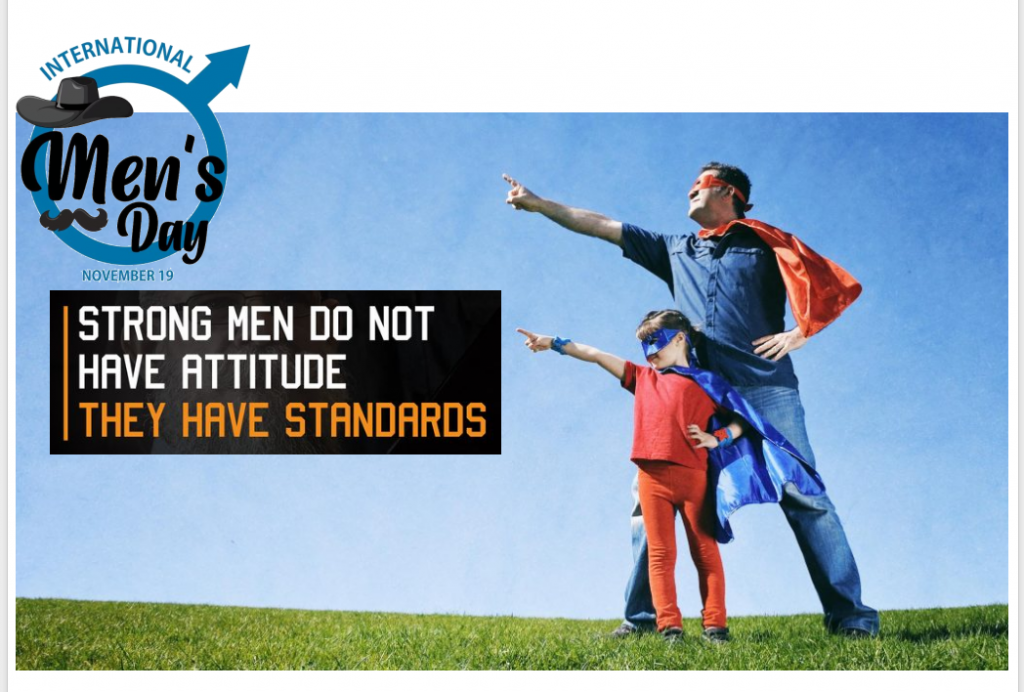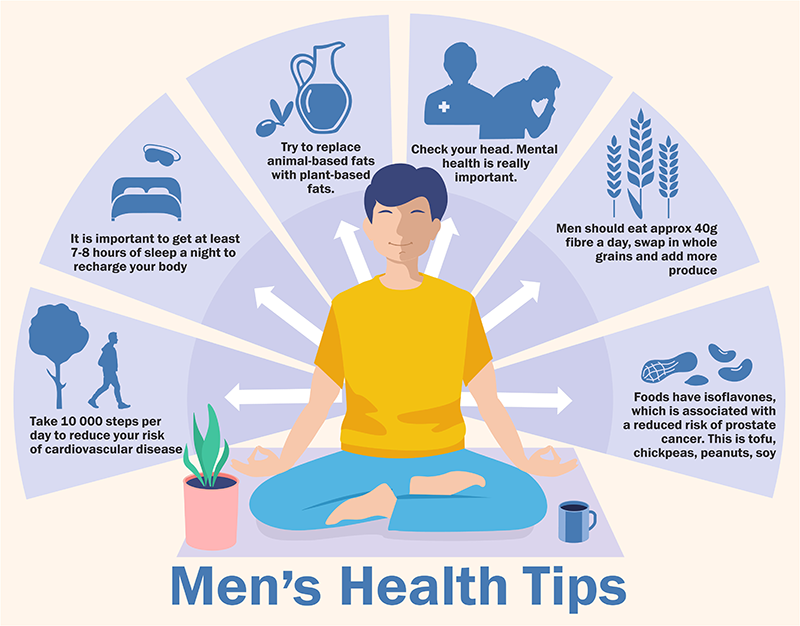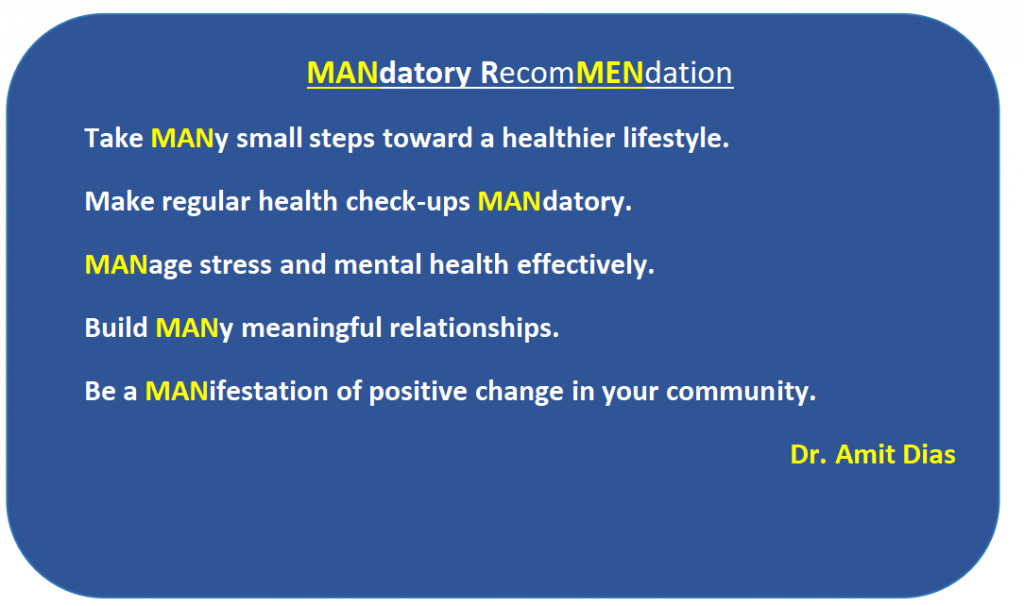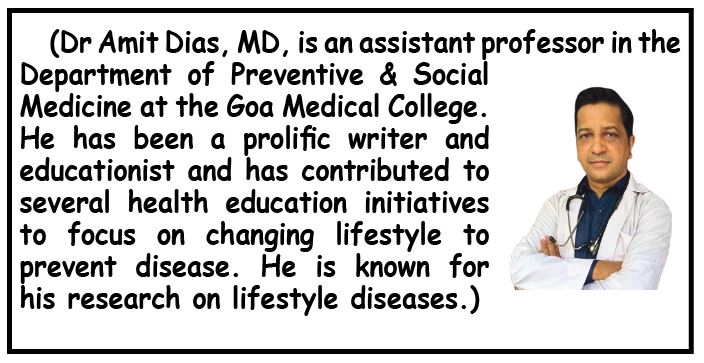Goa is abuzz with excitement as vintage bike and car owners, users, collectors and fans are decking […]

THE NEED FOR MORE POSITIVE MALE ROLE MODELS…
MIND & BODY, HEART & SOUL, Nov 23- Nov 29 2024 November 22, 2024International Men’s Day!
Many do not know about International Men’s Day, observed on November 19. Dr Amit Dias reminds us that MAN is also huMAN and needs to take care of his health to be a role model in society. ‘The world needs more positive male role models, he explains in this Q&A interview…its mandatory for everyone to read!
An interview with Dr Amit Dias
The theme this year for International Men’s Day is “Positive Male Role Models” —urging men to be the change they want to see in themselves to inspire the lives they live in positive ways. International Men’s Day is a call for men to not only be role models in society but also to prioritize their own well-being. MAN is also HUMAN and they should adopt positive changes in their lifestyle and be active participants in societal transformation. By taking responsibility for their health, relationships, and community men can lead by example and inspire others.
Goan Observer: Why does the world need more ‘Positive Male Role Models’?
Dr Amit Dias: Male role models are essential for shaping the values and behavior of individuals and society. Positive male role models inspire others through their actions, demonstrating qualities like integrity, empathy, resilience, and respect for others. This is particularly important today as we face increasing societal challenges like gender-based violence, inequality, and a lack of work-life balance. By “positive” we definitely do not mean HIV Positive…. but refer to the positive role that men could and should play in the society.
Positive male role models can:
- Redefine Masculinity: They help break stereotypes of masculinity as being synonymous with dominance or emotional suppression. Instead, they promote vulnerability, kindness and emotional intelligence as strengths.
- Inspire Young Men: Boys and young men often emulate behavior they see in their fathers, teachers or community leaders. Role models who display respect for women, personal discipline and community service set the foundation for a more equitable and compassionate society.
- Champion Gender Equality: Men in leadership positions can actively promote inclusivity and equity, influencing policies and practices to empower women and marginalized communities.
- Encourage Responsibility: Positive male role models teach accountability and responsibility, whether in personal relationships, workplaces or communities.
- Promote Mental Health Awareness: They show that it’s okay to seek help, express emotions and prioritize mental health, challenging the stigma around men’s mental wellbeing.
When men step into the role of mentors and guides, they not only transform individual lives but also contribute to building healthier families and communities. The theme reminds us that the world doesn’t just need men—it needs more men who inspire and lead with a sense of purpose and humanity. In a broader sense, whether male or female, the new generation needs better positive role models. The kind of portrayal of men we sometimes see in movies, and the societal expectations, could leave a person disillusioned.

Q: How can men take care of their mental health, especially given societal expectations?
A: One of the most harmful societal pressures is the idea that “men do not cry.” This mindset forces men to suppress their emotions, increasing the risk of mental health challenges such as anxiety, depression or even suicide. Globally, men are less likely to seek help for mental health issues, contributing to higher suicide rates.
To address this, men need to normalize expressing emotions, engage in stress-relieving activities like exercise and mindfulness, and seek professional help when necessary. Therapy and counseling are not signs of weakness but of courage and self-awareness.
Q: What are the main health challenges men face, and why are they more vulnerable to chronic health issues?
A: Men are at greater risk for chronic illnesses such as heart disease, diabetes, and certain cancers due to a combination of biological, behavioral, and societal factors.
Risk factors:
• Smoking and Alcohol Use: Men have higher rates of tobacco and alcohol consumption than women. For example, in India, nearly 29% of men consume tobacco compared to just 3% of women.
• Sedentary Lifestyle: Lack of physical activity, especially in urban settings, has led to increased obesity and related conditions.
• Delayed Health-Seeking Behavior: Men often ignore symptoms or delay seeking medical help.
• Stress: Workplace stress and societal pressures significantly contribute to hypertension and cardiovascular problems.
The solution lies in making regular health check-ups, screening tests, a healthy diet, exercise and stress management strategies part of your lifestyle.

Q: What screening tests should men undergo to detect health problems early?
A: Preventive care can save lives. Men should consider the following screenings:
• Blood Pressure: Annually from age 20.
• Lipid Profile: Every 5 years starting at 20, or earlier if there is a family history of heart disease.
• Blood Sugar Levels: Every 3 years starting at 30.
• Prostate Cancer Screening: From age 50, or earlier for those with a family history.
• Colorectal Cancer Screening: From age 45.
• Mental Health Assessments: Regular evaluations for stress, depression, and anxiety.
Q: What about men’s sexual health? Is male menopause a myth or reality?
A: Men’s sexual health is an important aspect of their overall wellbeing. Common issues like erectile dysfunction and reduced libido often have treatable underlying causes, such as diabetes, hormonal imbalances or stress.
Male menopause, or andropause, is real but differs from female menopause. It involves a gradual decline in testosterone levels after the age of 30, which can lead to symptoms such as fatigue, irritability and reduced sexual drive. Lifestyle changes, regular exercise and, in some cases, medication can help manage these symptoms.
Q: What according to you is an ideal Indian man in terms of health?
A: An ideal Indian man would:
• Maintain a healthy weight with a Body Mass Index (BMI) between 18.5 and 22.9.
• Exercise for at least 150 minutes a week. Try to achieve 10,000 steps per day.
• Eat a balanced diet rich in whole grains, lean proteins, fruits, and vegetables.
• Should sleep for at least 7-8 hours per day
• Avoid smoking and limit alcohol consumption.
• Have regular health check-ups to detect and manage diseases early.
Q: What should a man eat to stay healthy?
A: Diet should be tailored to the needs of the individual. However in general, a balanced Indian diet for men should include:
• Carbohydrates: Choose whole grains like brown rice, oats and millets. There is a lot of focus on millets recently.
• Proteins: They are the building blocks. Incorporate lentils, beans, eggs, fish and lean meats.
• Healthy Fats: Include nuts, seeds and foods rich in omega-3 fatty acids like flaxseeds and fish.
• Fruits and Vegetables: Aim for at least 5 servings a day for essential nutrients and fiber (at least 40 gms per day)
• Dairy: Opt for low-fat milk, yogurt or paneer for calcium and vitamin D.
• Hydration: Drink 2.5–3 liters of water daily.
Avoid processed foods, sugary beverages, and trans fats.
Q: Can men have body dysmorphia? What causes it, and how can it be addressed?
A: Yes, men can experience body dysmorphia, a mental health condition where individuals obsess over perceived flaws in their appearance. Recently, some of the celebrities have expressed their struggle with their body image. For men, this often manifests as muscle dysmorphia or dissatisfaction with body size and shape.
Causes:
• Unrealistic societal and media standards of male physique.
• Pressure to conform to the “ideal” masculine image.
• Underlying mental health conditions like anxiety or low self-esteem.
Solutions:
• Therapy, particularly cognitive-behavioral therapy (CBT), to address negative thought patterns.
• Promoting body positivity and focusing on overall health rather than appearance.
• Building a supportive social network.
Q: What is the role of men in a family, and particularly as fathers?
A: Men play a crucial role in family dynamics by providing emotional support, fostering a nurturing environment, and being responsible partners and parents. As fathers, as the theme suggests, they serve as role models, imparting values, discipline, and emotional security to their children. A father’s active involvement in their children’s lives contributes significantly to their emotional and cognitive development.
Q: What message would you give to all men on Men’s Day?
A: Men need to embrace self-care, take responsibility for their health, and redefine masculinity to include empathy, compassion, and strength. A healthier man contributes to a healthier family and society.
On Men’s Day and everyday let us celebrate men not just for their achievements but for their efforts to grow, nurture and inspire those around them.















